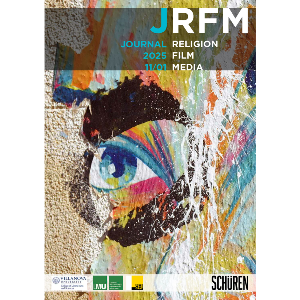Journal for Religion, Film and Media



The Journal for Religion, Film and Media is a peer-reviewed, open access, online publication. It offers a platform for scholarly research in the broad field of religion and media, with a particular interest in audio-visual and interactive forms of communication. It engages with the challenges arising from the dynamic development of media technologies and their interaction with religion in an interdisciplinary key. It is published twice a year, in May and November.
JRFM is edited by a network of international experts in film, media and religion with professional experience in interdisciplinary research, teaching and publishing, linking perspectives from the study of religion and theology, film, media, visual and cultural studies, and sociology. It is published in cooperation between different institutions in Europe and the USA, particularly the University of Graz, the University of Munich and Villanova University, in cooperation with the Schüren publishing house in Marburg. JRFM is published also as a print-on-demand.
Journal for Religion, Film and Media
Chief editors
Stefanie Knauss, Villanova University
Alexander Darius Ornella, University of Hull
Daria Pezzoli-Olgiati, University of Munich
Christian Wessely, University of Graz

Heft 11.1 ab 15. Mai online!
Issue Editors: Philippe Bornet and Stefanie Knauss
Congratulations, JRFM! With this issue we celebrate the tenth anniversary of the Journal for Religion, Film and Media (JRFM). We use this moment to take stock of current challenges and to consider future developments in the study of religion and media. In its Thematic Section, this issue collects contributions in which scholars involved in the work of the journal explore aspects that they feel are significant for the field at this moment and that may influence its future direction. These include reflections on the challenges of open access publishing, the institutional conditions that shape research on religion, film and media, the opening of the field to non-Western contexts, the role of media in facilitating inter- and transcultural interactions, the importance of studying the role of media for non-religion, and the methodological challenges that need to be considered when researching religion and media. The response by Giulia Evolvi places the articles in the wider context of what she sees as current trends and challenges in the field. The Open Section includes an article by Robert K. Johnston, whose research on theology and film has had a major impact on the study of religion and media.
The issue can be downloaded at JRFM or can be ordered in print from Schüren.